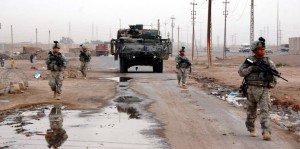The Concept of New Wars
We talked a lot in class about ISIS and the threat they pose to the United States, but what we continually skirted over was how they demonstrate a shift in warfare. Unfortunately, as long as humans exist I believe there will always be some type of conflict occurring. However, the rhyme and reason behind these conflicts will undoubtedly alter, as is human nature to evolve and progress. Political Scientist Mary Kaldor has argued that there now exists “New Wars”. When analyzing the wars of today Kaldor’s innovation of the term ‘new wars’ proves extremely useful in understanding the main forces driving current conflicts. The term ‘new wars’ states that there have been changes in actors, methods, goals and finances of war. Wars of today are with non-state actors, funded underground, identity based and extremely difficult to win. 
One of the biggest changes that have caused the term new wars to be especially useful in understanding contemporary warfare is the drastic shift in involved actors. Currently the warfare has descended into the ranks of guerilla task forces with a variety of factions within armed forces. There is no longer a unified army but rather many subsets of fighting forces, campaigning for the same agenda. These actors are very often unorganized and untrained. The scope of involved forces is no longer limited to governmental agencies; non-governmental forces may be used as well to combat[1]. The new actors can come in a variety of shapes, for instance jihadists, or warlords. [2]This however, does not mean that governmental forces do not take part in the new wars, they most certainly do, however, the scope of their involvement is often one-sided and limited.
If we are able to understand these wars are fundamentally different to traditional wars we can gain a better knowledge of how to address the conflicts. By acknowledging that identity-politics now dominates the current wars, NGOS and international organizations are able to use resources to fund beneficial ways of resolving conflict. Through strengthening a country’s civil society, to encouraging a positive political culture, the differences in which conflicts must be addressed are astronomical compared to those of the past. In order to progress and find the thing closest to international peace, we must accept the fact that wars have indeed and will continue to change.
.
[1] Shaw, Martin. “The Contemporary Mode of Warfare? Mary Kaldor’s Theory of New Wars.” Review of International Political Economy 7, no. 1 (2000): 171-92.
[2] Kaldor, Mary. “In Defence of New Wars.” Stability:International Journal of Security and Development 2, no. 1 (2013): 2165-627. Accessed December 6, 2014. http://www.stabilityjournal.org/article/view/sta.at/41
